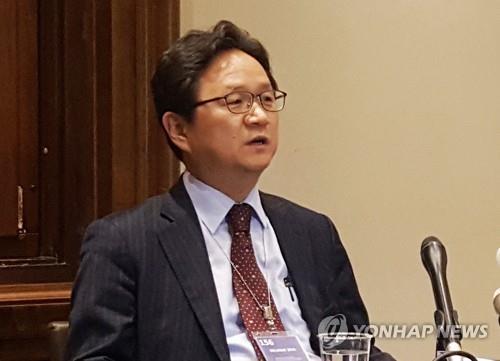Korea, Japan fail to narrow differences in trade talks

Chung Hae-kwan, South Korea’s chief negotiator in trade talks with Japan, speaks to reporters at the World Trade Organization headquarters in Geneva, Switzerland, on Nov. 19, 2019. (Yonhap)
Geneva: South Korea and Japan failed to narrow their differences in a second round of talks Tuesday aimed at resolving their dispute over Tokyo’s export restrictions, Seoul’s chief negotiator said.
The six-hour-long meeting was arranged as part of a dispute settlement process under rules of the World Trade Organization.
South Korea earlier filed a complaint with the global trade body over Japan’s adoption of export controls against the neighboring country in July.
“The two sides have had two rounds of focused discussions, each time for six hours, during which we deepened our understanding of each other’s measures and positions,” Chung Hae-kwan, the South Korean negotiator, told reporters after the talks.
“However, we do not believe the respective positions of the two sides have changed,” he said, adding that the delegation will carry out a detailed assessment upon returning to Seoul.
“We will conduct a comprehensive review of our options, including requesting the establishment of a panel” at the WTO Dispute Settlement Body, he added, referring to a process by which the WTO would issue a ruling on the dispute.
The export controls apply to three materials — resist, etching gas and fluorinated polyimide — that are critical to South Korea’s production of semiconductors and flexible displays.
Under the new rules, Japanese companies are required to apply for an individual license to export the materials to South Korea, a process that can take up to 90 days.
Seoul views the measure as retaliation for a South Korean Supreme Court ruling that ordered compensation for Koreans forced into labor during Japan’s 1910-45 colonial rule of the Korean Peninsula.
“We do not rule out the possibility of a third round of bilateral talks, but the possibility is not high,” Chung said. “We will not have talks for the sake of talks.”
The first round of talks held in October also ended without results.
YONHAP

























































